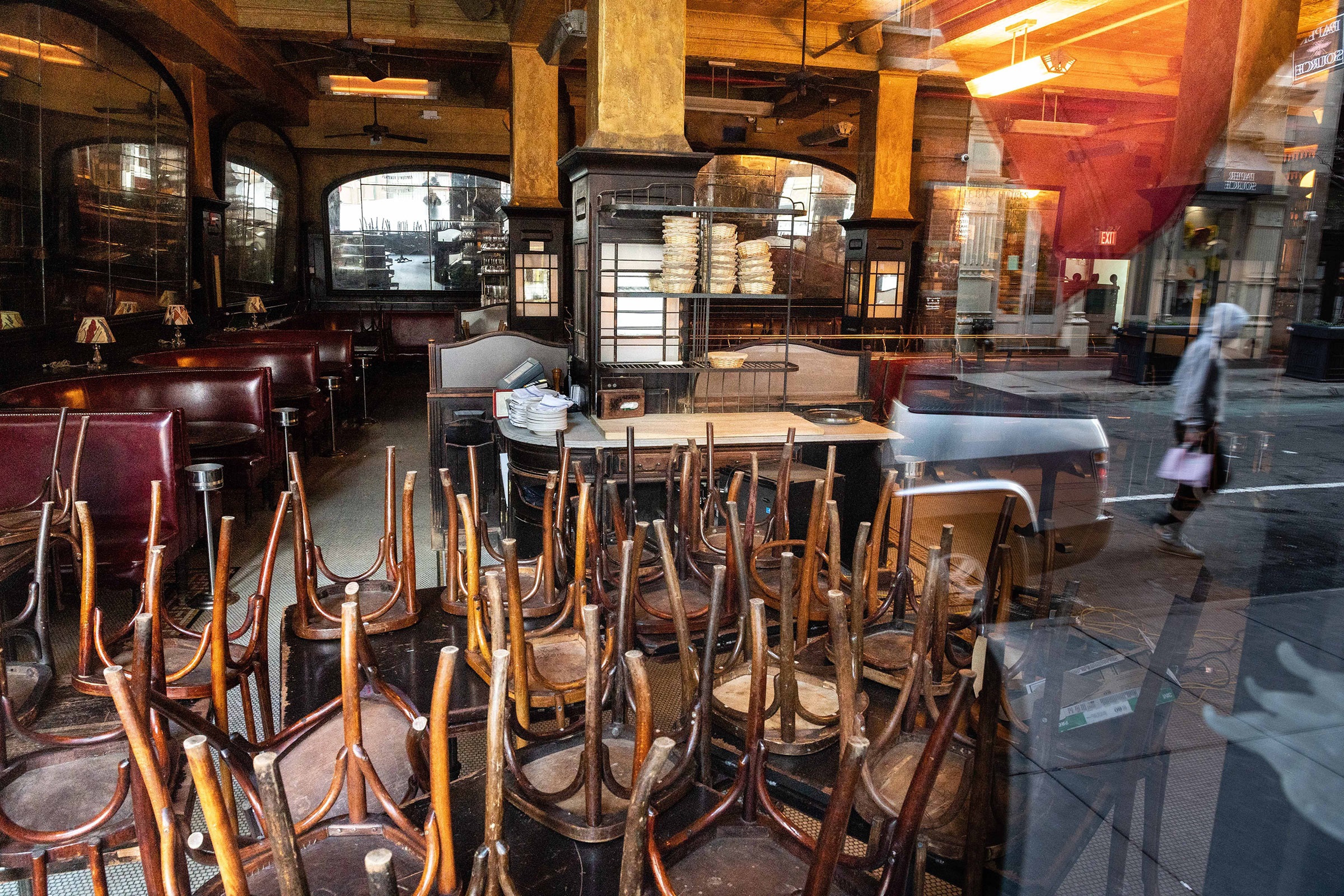
The interior of the restaurant Balthazar in New York. All bars, restaurants and nightclubs were ordered shut by Governor Cuomo, effectively putting New York City under lockdown to combat the COVID-19 coronavirus. NYC, March 17, 2020.
SINGAPORE: Sofi Sui, owner of the Italian restaurant Pasta Brava has, by her estimate, lost S$1 million over the course of the COVID-19 pandemic.
The latest restrictions – a return to Phase 2 (Heightened Alert), which again prohibits people from dining in – means she will have to dip into her reserves once more, she told CNA.
“For sure it’s going to affect (businesses) because, especially for myself, I have been coming out with my own personal savings,” said Ms Sui, adding that this is despite help from the Government.
The restrictions will last till Aug 18. Ms Sui, who is also a chef, said that she has “no heart” to wind up her restaurant.
“If I lost S$1 million, from a business point of view, I have to cut already, but the point now is that I basically just don’t have the heart to,” she said.
“I can’t stop now. Why? Because I (have) already lost so much.”
Her main concerns are the commitment she has made to more than 20 employees who work at the restaurant and another cafe she owns, and the S$400,000 she has invested in the outlet that Pasta Brava will be moving to, she said.
“This time, maybe I will have to lose another S$200,000? S$100,000? For me, my focus is always that I don’t have the heart to let go of my staff,” said Ms Sui.
She likened shutting down her business to divorce.
“There’s a relationship to it. You cannot just divorce a business. You divorce a spouse, it’s just one single human being … but the thing is that when it’s a business, it’s a whole entire team,” she said.
HANGING ON
Co-founder of Moonstone bar Jeremy Lim echoed the sentiment, that F&B is a passion-led business.
For three months running, the bar has been bleeding losses. To keep it afloat, Mr Lim and fellow shareholders are trying to raise capital to ensure cash flow for the next one to two months.
Failing which, they will have to take a loan, their second since the pandemic began.
“That’s not a good situation,” Mr Lim said, describing it as being in a “state of languish”.
“We don’t really know what to look forward to. We know we are going to work hard just so that we can pay all our staff and our rent and we take nothing out of it.”
BUSINESS IS LIKE A “BABY”
While the latest curbs on dining in have dealt a direct blow to the F&B industry, retail businesses are not spared either.
At zero-waste store Unpackt, co-founder Florence Tay lamented that the street that her store is on was “empty” on Thursday. She had been open for four hours and in that time, saw just one walk-in customer.
Having already closed one outlet, Ms Tay said that the latest round of restrictions has added to the strain. “Our income is quite volatile. We are just barely scraping through.”
She and another co-founder are in a “no-pay” situation, she said.
And because her business is classified as a supermarket, it falls outside the remit of certain government support schemes.
While Unpackt sells food and other items that are free of packaging, the core of the business is educating people on environmentally friendly practices, holding farmers’ markets that showcase items made by small outfits and supplying office pantries, she said.
Despite the struggle, and discussions on whether they should cut their losses, the founders continue to pump in their own savings.
“The business, for us, is like a baby. You take so much time and effort to nurture the child, and then after that suddenly you say kill the child,” she said.
But even as footfall slows to a trickle, one family-run business said it is readjusting to the conditions.
Fashion One, which has several outlets, is surviving for now, but only because the owner is drawing on his reserves, said general manager Nazreen Sharief.
The main consideration for keeping the business alive is the welfare of its long-serving employees, many of whom are getting on in age, as well as loans that need to be serviced, Ms Nazreen said.
While the return of restrictions has hurt, it has also provided a playbook.
“We learn and we adapt. We manage our expectations and our sales targets based on what happened in the past,” she said.
“This time, it’s a bit easier because it’s the same scenario that happened the last time, so we can use that as a template.”


